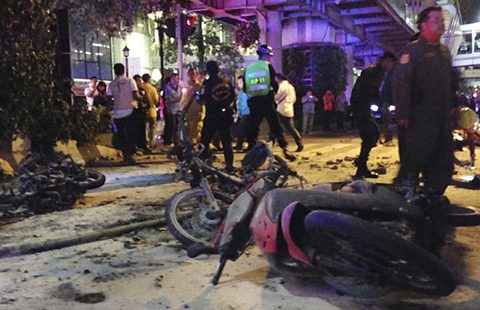
Debris from the blast in Bangkok. Photo by AP.
To get a clearer picture of who might be responsible, New Mandala spoke to security and Thailand expert Dr John Blaxland from the Australian National University.
These are Blaxland’s responses.
In the absence of any clear declaration claiming ownership, there are three broad possibilities for who is responsible for the bomb blast in Bangkok overnight: the military, Red Shirt supporters, or insurgents from Thailand’s Deep South.
At the same time, there are other rumours circulating in Bangkok claiming that it is Uighurs or people linked to their cause who are behind the incident.
In terms of the military, this is not a very plausible scenario, but nonetheless it is important to address it.
Some would say that the motivation for the military, or a military proxy, carrying out such an atrocity is to justify their ongoing military rule after Thailand’s May 2014 coup and into 2017, when elections are next most likely to take place.
This latest act of terror would seem to cement support for their ongoing rule and tight control of the state.
However, Thailand’s military leaders are currently focused on developing the country’s economy and tourism, and an attack at such an important tourist site would not assist them in this.
An attack on the Erawan shrine also can be seen as inauspicious for the military government, reinforcing the implausibility of the military as the instigators. Reducing the auspiciousness of the Prayuth government is something they would seek to avoid. In addition, their grip on power remains quite strong.
There is no compelling reason why they would feel a need to fabricate an additional and artificial security crisis. For these reasons I don’t think the military is behind it.
Another possibility is that it is a member of, or a supporter of, the Red Shirt political faction, the group which supports former prime minister Thaksin Shinawatra and his sister Yingluck.
They have been marginalised and frustrated by the military government’s success so far in containing political unrest and bringing about legislative changes inimical to the Red Shirts’ interests.
This incident could be seen as an attempt to undermine the military government’s sense of control or to add pressure to return to elections and civilian rule.
It must be remembered that the Erawan shrine, at the heart of the fashionable Rachaprasong shopping district, is also the scene of the May 2010 Red Shirt barricade, which after prolonged demonstrations and protests lead to violence that saw many hundreds injured and at least 90 killed, from the military and both sides of politics. It has great significance for the Red Shirts.
Striking at the heart of downtown Bangkok would be a blow to the nation’s elite, those who have often opposed the Red Shirts and their political aspirations. It would also be a powerful reminder of the power and support of the Red Shirts’ nominal leader, Thaksin.
The third possibility is that it is insurgents from Thailand’s Deep South, who have been waging a separatist campaign there for many years.
The modus operandi of this blast fits with their methods in that it is an improvised explosive device delivered by a motorbike and placed at the foot of a shrine. Thais who live in the Deep South are very familiar with such blasts as they are an all too common occurrence.
However, I think it is unlikely that the bomb came from this group. In all their long years fighting the state, they have avoided making attacks in Bangkok their priority. In fact, they tend to avoid attacking cities in general. They’ve attacked Hat Yai, but have deliberately avoided attacking so far north or a city as large as Bangkok.
In addition, the insurgents from the Deep South have worked very hard to distance themselves from the global war on terror and the violent extremism of other groups, so as to avoid being entangled in operations that would see them suffer under the heavy hand of the US.
It would make no sense for them to change this approach now, and for that reason I don’t think this latest tragedy is the actions of insurgents.
That’s why on the balance of things, with no one claiming ownership of the attack, I think it would be most likely to have been instigated by a supporter of the Red Shirts.
Outside of these three possible groups, there are rumours that Uighurs or people supportive of their movement are behind the attack.The Uighurs have opposed the Chinese state for many years, sometimes resorting to violence, and only last month Thailand sent back over 100 Uighur asylum seekers to China.
Once again, I don’t think this is plausible, but it goes to show that amid the chaos and confusion it is hard to know exactly what has happened and why.
Whoever is responsible for this terrible tragedy, such violence has no place in any society, and should be abhorred.
 Facebook
Facebook  Twitter
Twitter  Soundcloud
Soundcloud  Youtube
Youtube  Rss
Rss 